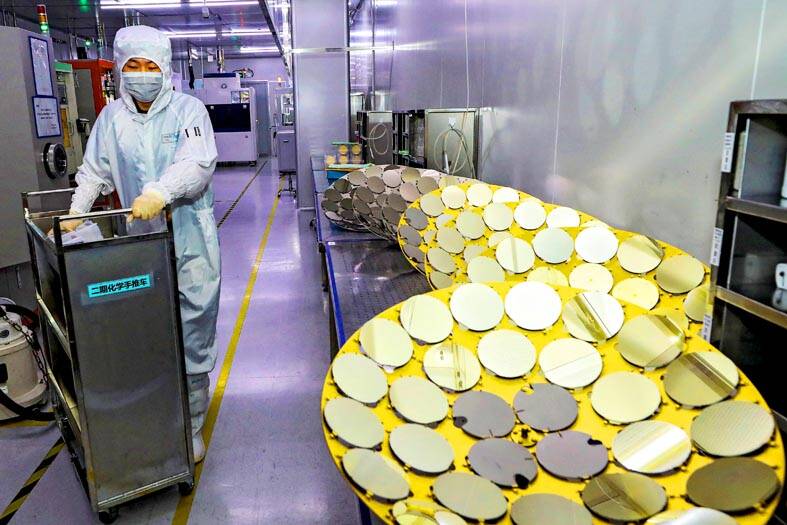Chinese imports of equipment to make semiconductors hit a record for the first seven months of this year as its companies continue to ramp up purchases in case the US and its allies further block them from buying.
Chinese firms imported almost US$26 billion of chipmaking machinery, fresh trade data released by the Chinese General Administration of Customs this week showed.
That surpassed the previous high mark in 2021 and comes as US, Japanese and Dutch officials work on increasing restrictions on Chinese companies.

Photo: AFP
Chinese purchases from firms such as Tokyo Electron Ltd, ASML Holding NV and Applied Materials Inc have soared in the past year.
During the period, Chinese companies bought more lower-end equipment after the US and its allies tightened controls on their access to the most cutting-edge technology.
That spending spree has helped drive Dutch exports to China to new highs, exceeding US$2 billion last month for only the second time on record.
Dutch company ASML’s sales to China surged 21 percent year-on-year in the second quarter to hit almost half of its total revenue, with sales consisting of unrestricted older systems as Beijing pushes to make more mature types of semiconductors.
ASML is the sole supplier of the most advanced lithography equipment required to make cutting-edge chips. China’s Semiconductor Manufacturing International Corp (中芯) relied on ASML’s older generation of lithography machines to achieve a technological breakthrough last year, Bloomberg News has reported.
Chinese chipmakers are expected to grow their output by 14 percent to 10.1 million wafers per month next year, or nearly a third of the global industry’s production, after achieving a 15 percent increase this year, trade group SEMI estimated in June.
The US has been tightening rules that would restrict China’s progress in critical technologies including semiconductors and artificial intelligence.
Those measures include repeated rounds of export controls limiting the sale of advanced chips and equipment capable of making those components.
Separately, one of China’s most prominent chip gear makers is suing the Pentagon for linking it to the Chinese People’s Liberation Army, seeking to get off a blacklist that bars business with US firms.
Advanced Micro-Fabrication Equipment Inc (中微半導體) alleged that the US defense agency harmed the company’s business and reputation by adding the Shanghai entity to the so-called Section 1260H list of firms linked to China’s military, the company said in its lawsuit.
The Chinese company competes with top US firms including Applied Materials and Lam Research Corp.
In its latest annual report, the Chinese company said some of its machines are now being used to make chips as advanced as 5-nanometers, or technology only one generation behind the most cutting-edge.

ADVANCED: Previously, Taiwanese chip companies were restricted from building overseas fabs with technology less than two generations behind domestic factories Taiwan Semiconductor Manufacturing Co (TSMC, 台積電), a major chip supplier to Nvidia Corp, would no longer be restricted from investing in next-generation 2-nanometer chip production in the US, the Ministry of Economic Affairs said yesterday. However, the ministry added that the world’s biggest contract chipmaker would not be making any reckless decisions, given the weight of its up to US$30 billion investment. To safeguard Taiwan’s chip technology advantages, the government has barred local chipmakers from making chips using more advanced technologies at their overseas factories, in China particularly. Chipmakers were previously only allowed to produce chips using less advanced technologies, specifically

BRAVE NEW WORLD: Nvidia believes that AI would fuel a new industrial revolution and would ‘do whatever we can’ to guide US AI policy, CEO Jensen Huang said Nvidia Corp cofounder and chief executive officer Jensen Huang (黃仁勳) on Tuesday said he is ready to meet US president-elect Donald Trump and offer his help to the incoming administration. “I’d be delighted to go see him and congratulate him, and do whatever we can to make this administration succeed,” Huang said in an interview with Bloomberg Television, adding that he has not been invited to visit Trump’s home base at Mar-a-Lago in Florida yet. As head of the world’s most valuable chipmaker, Huang has an opportunity to help steer the administration’s artificial intelligence (AI) policy at a moment of rapid change.

TARIFF SURGE: The strong performance could be attributed to the growing artificial intelligence device market and mass orders ahead of potential US tariffs, analysts said The combined revenue of companies listed on the Taiwan Stock Exchange and the Taipei Exchange for the whole of last year totaled NT$44.66 trillion (US$1.35 trillion), up 12.8 percent year-on-year and hit a record high, data compiled by investment consulting firm CMoney showed on Saturday. The result came after listed firms reported a 23.92 percent annual increase in combined revenue for last month at NT$4.1 trillion, the second-highest for the month of December on record, and posted a 15.63 percent rise in combined revenue for the December quarter at NT$12.25 billion, the highest quarterly figure ever, the data showed. Analysts attributed the

Taiwan Semiconductor Manufacturing Co’s (TSMC, 台積電) quarterly sales topped estimates, reinforcing investor hopes that the torrid pace of artificial intelligence (AI) hardware spending would extend into this year. The go-to chipmaker for Nvidia Corp and Apple Inc reported a 39 percent rise in December-quarter revenue to NT$868.5 billion (US$26.35 billion), based on calculations from monthly disclosures. That compared with an average estimate of NT$854.7 billion. The strong showing from Taiwan’s largest company bolsters expectations that big tech companies from Alphabet Inc to Microsoft Corp would continue to build and upgrade datacenters at a rapid clip to propel AI development. Growth accelerated for